Charles E W Bean, Diaries, AWM38 3DRL 606/251/1 - 1915 - 1936 - Part 21
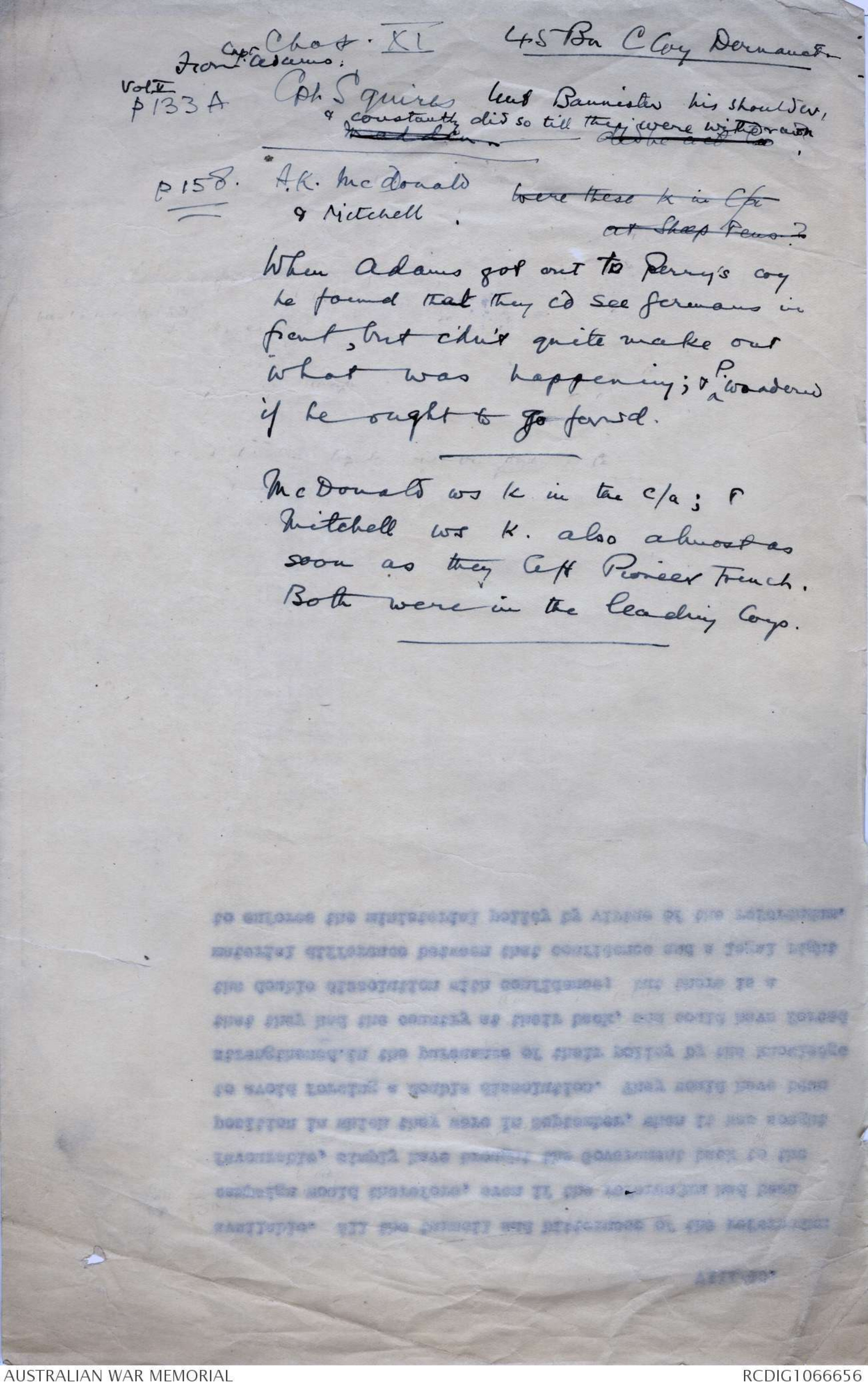
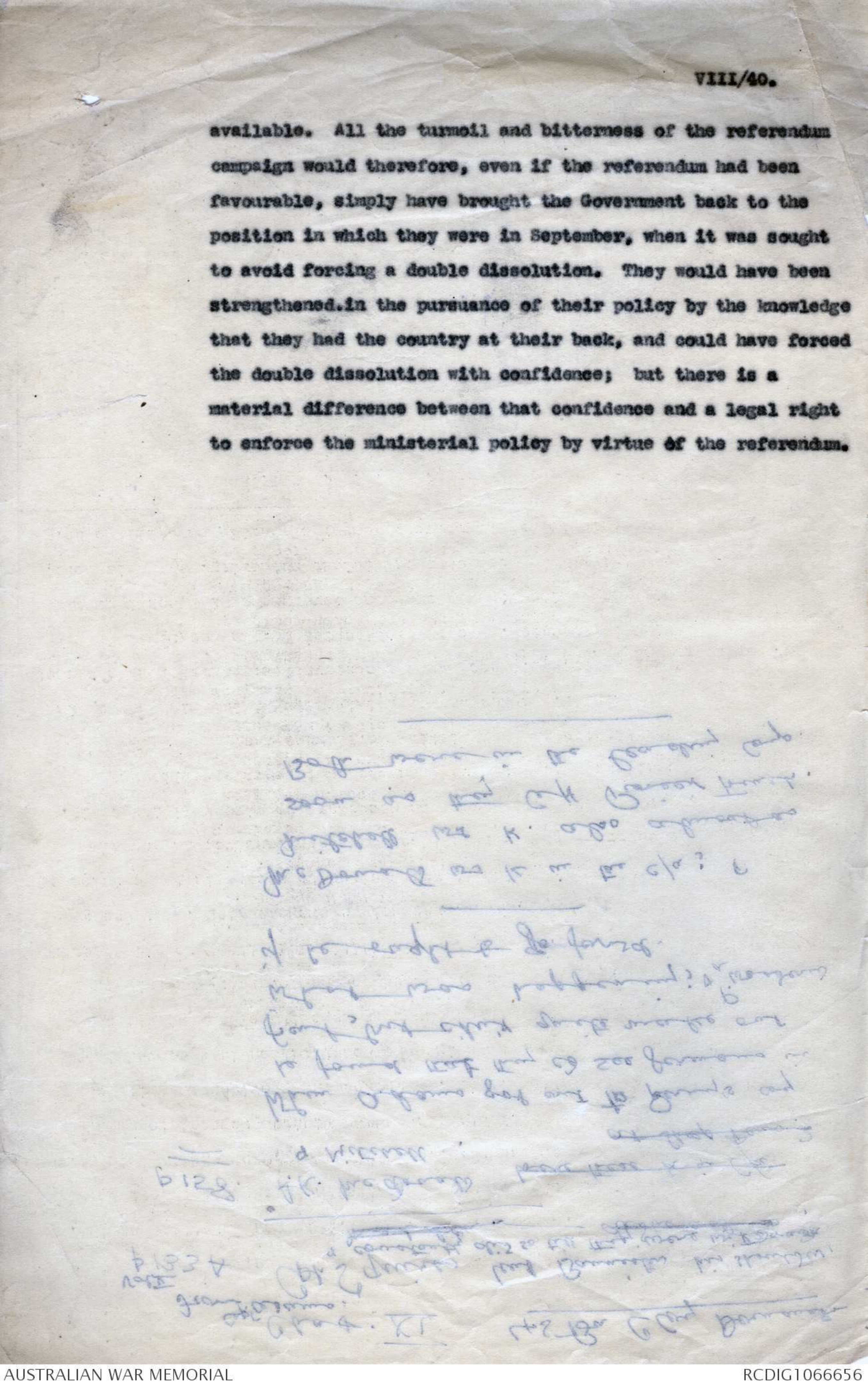
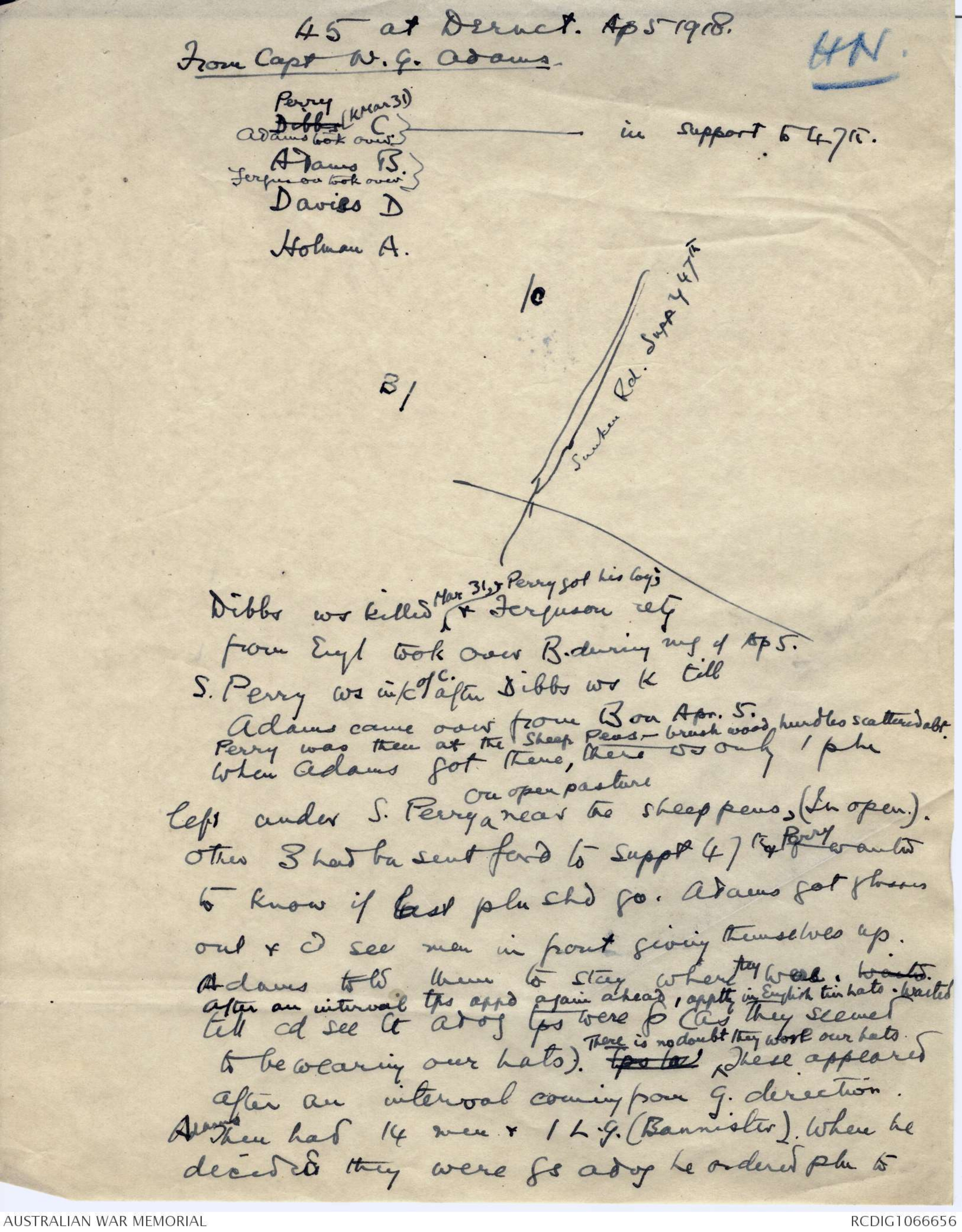
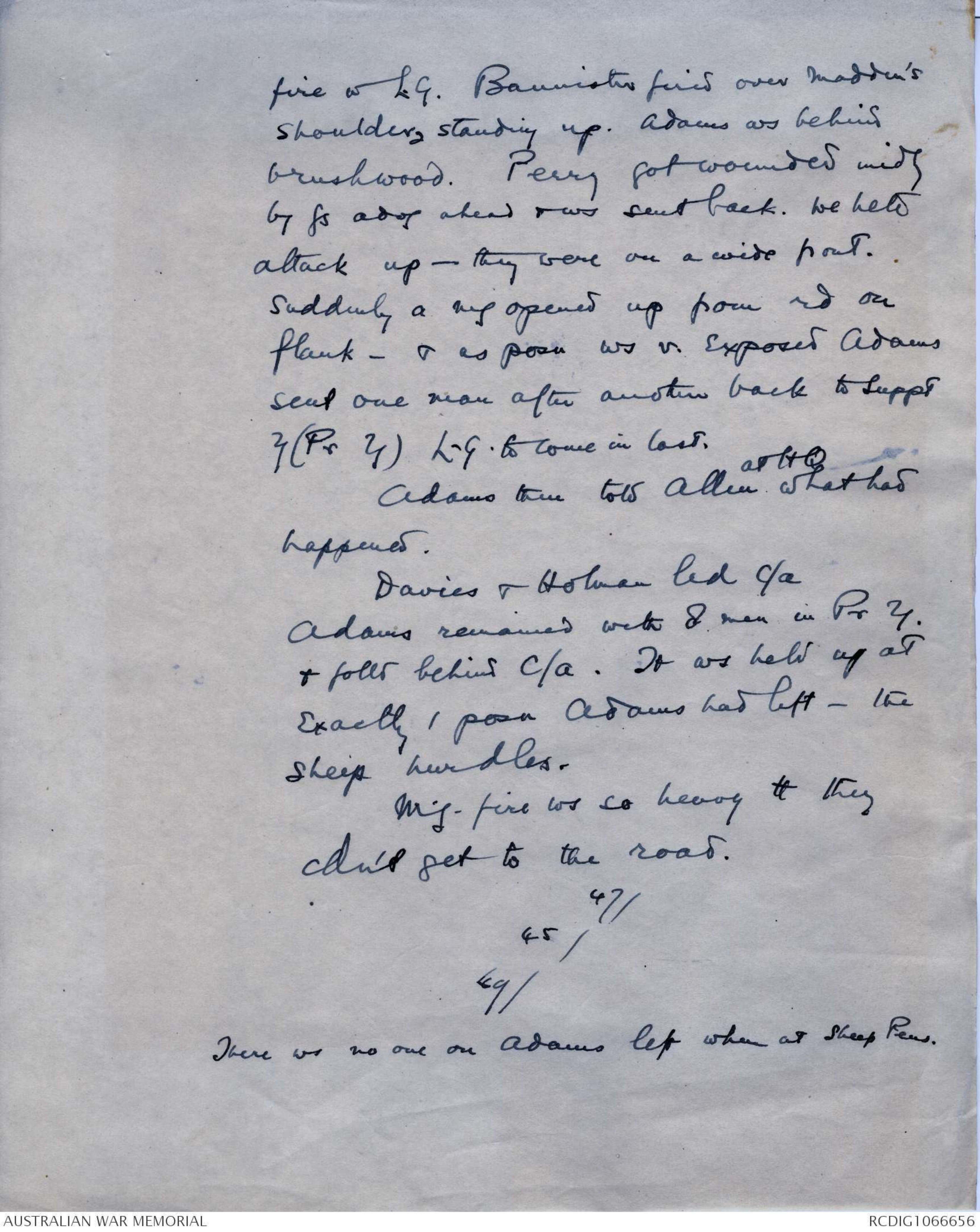
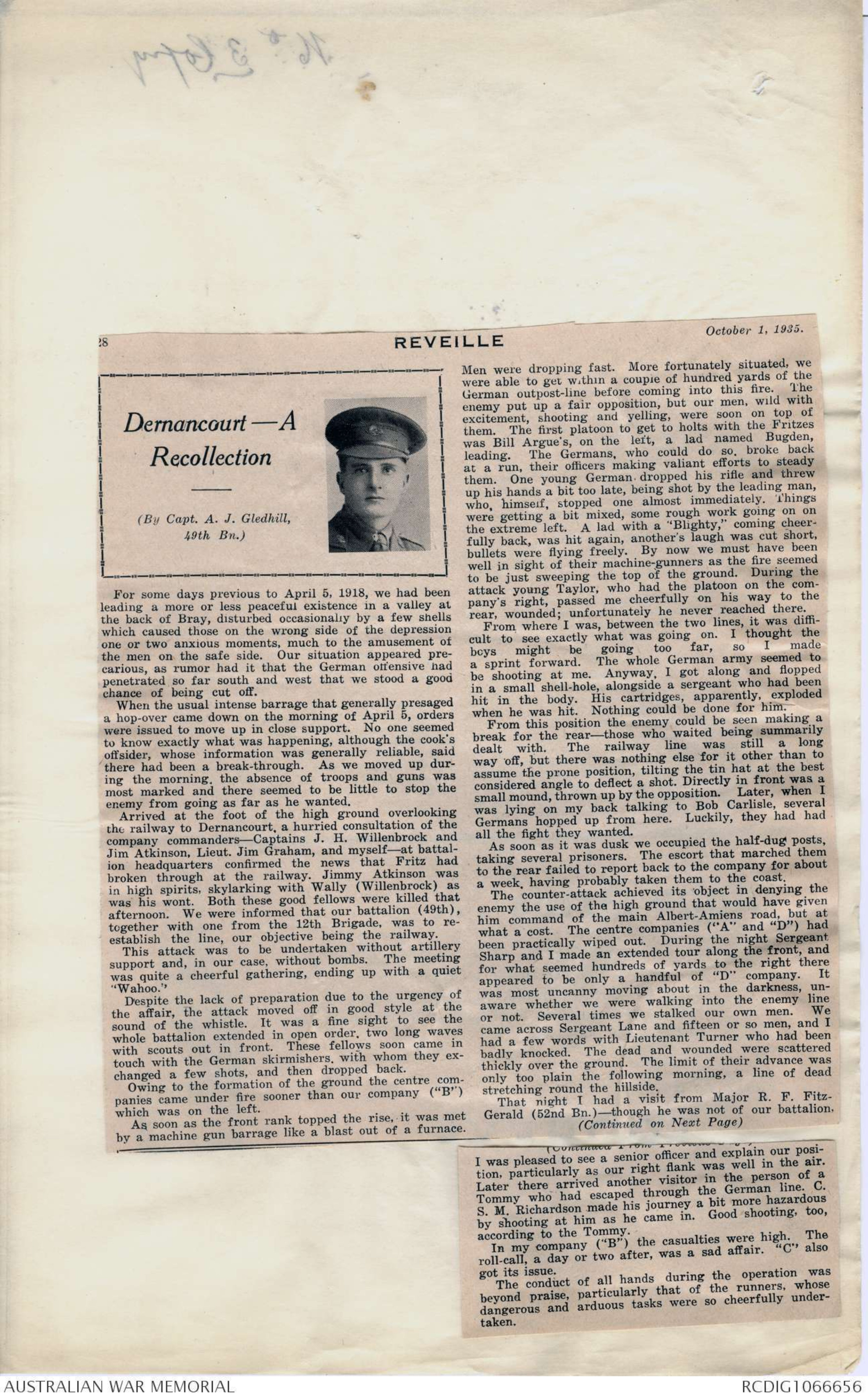
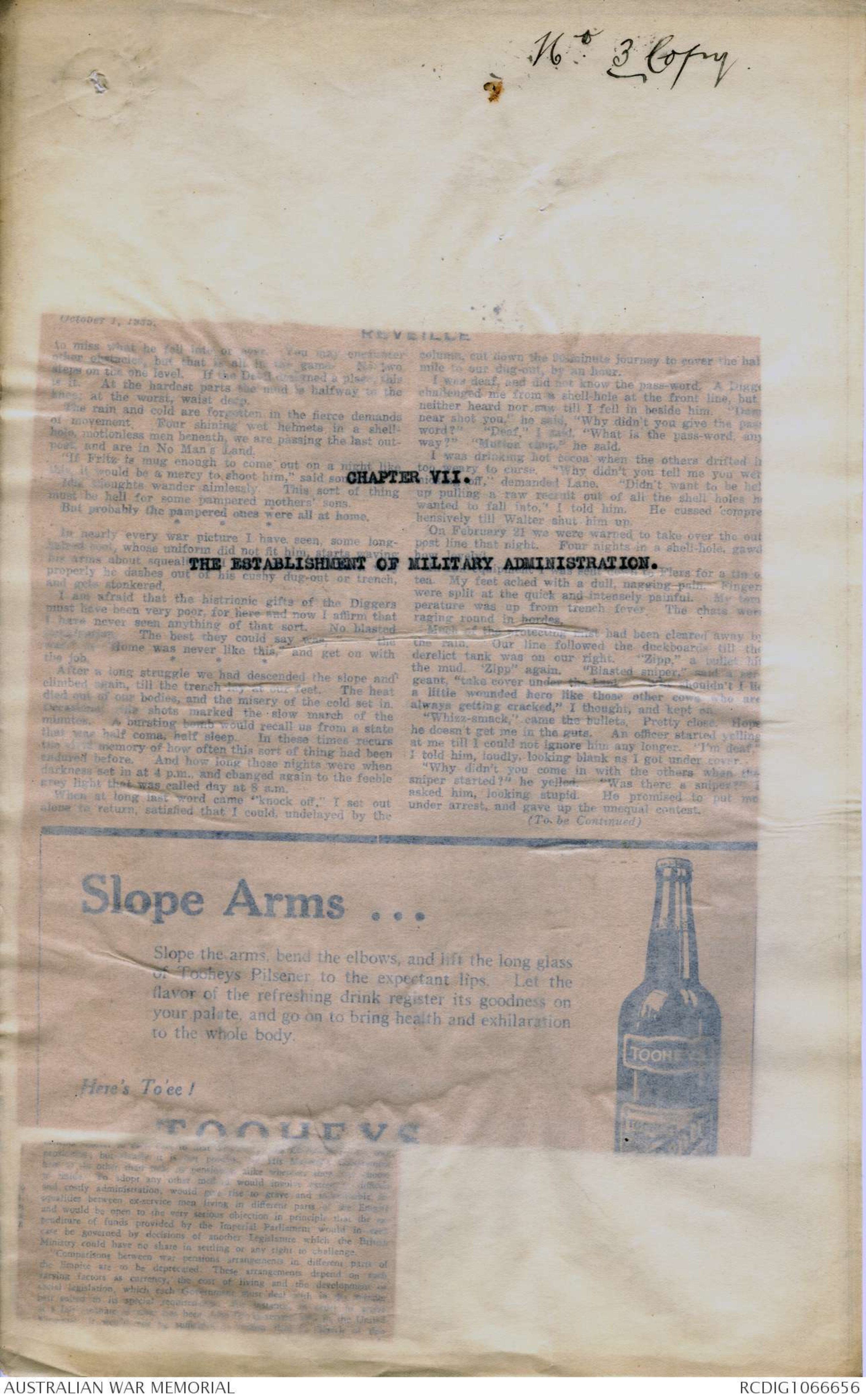
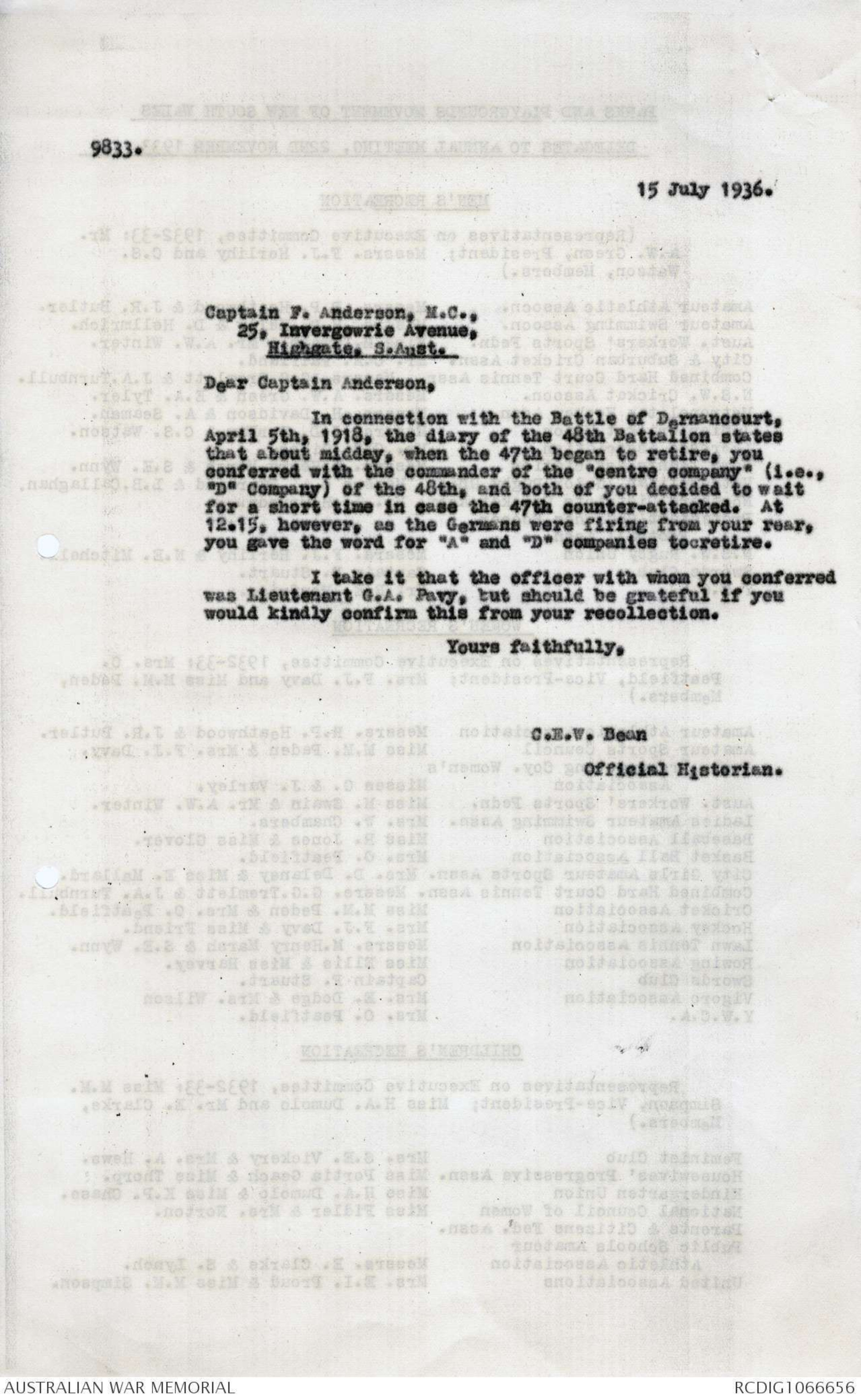
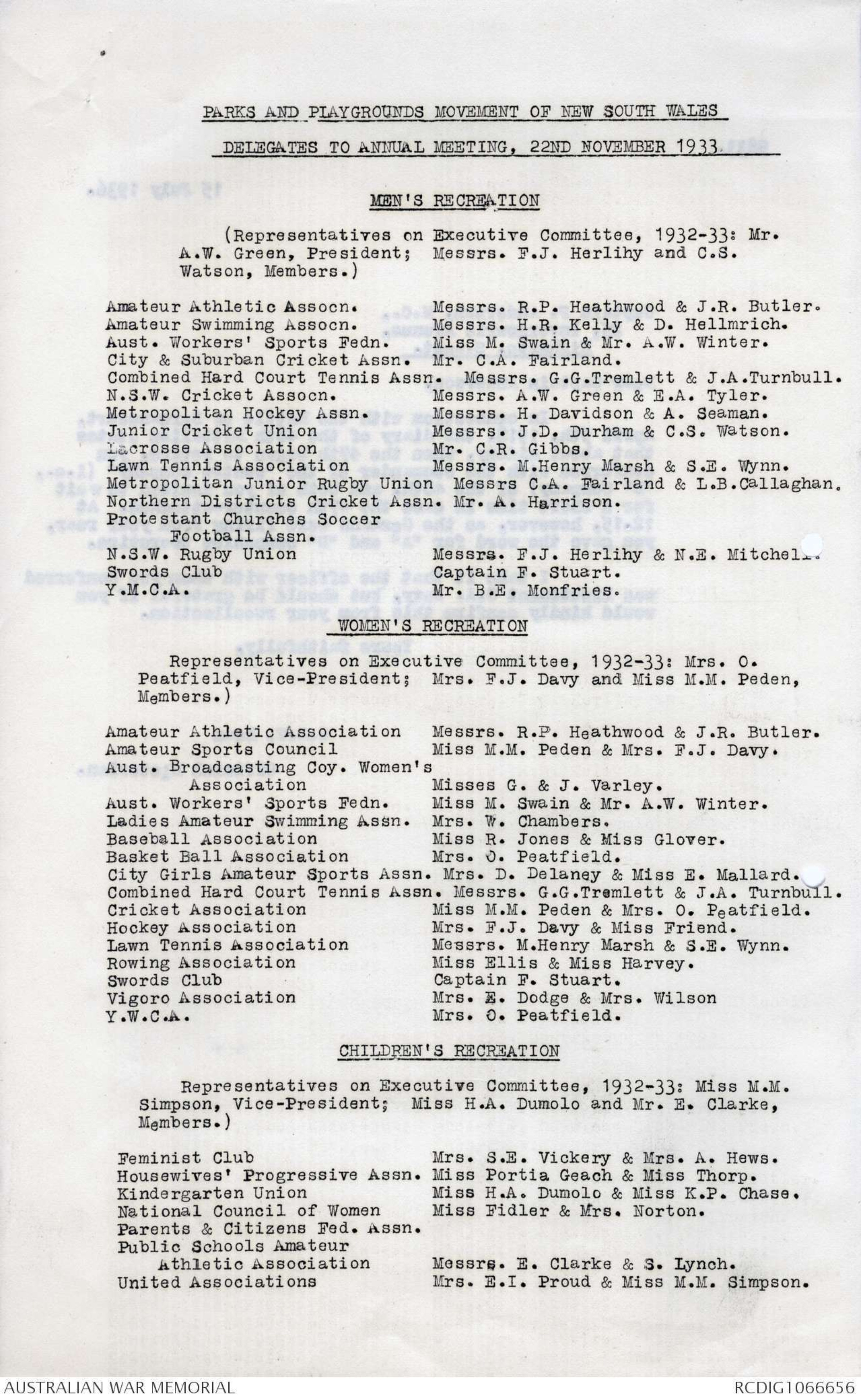
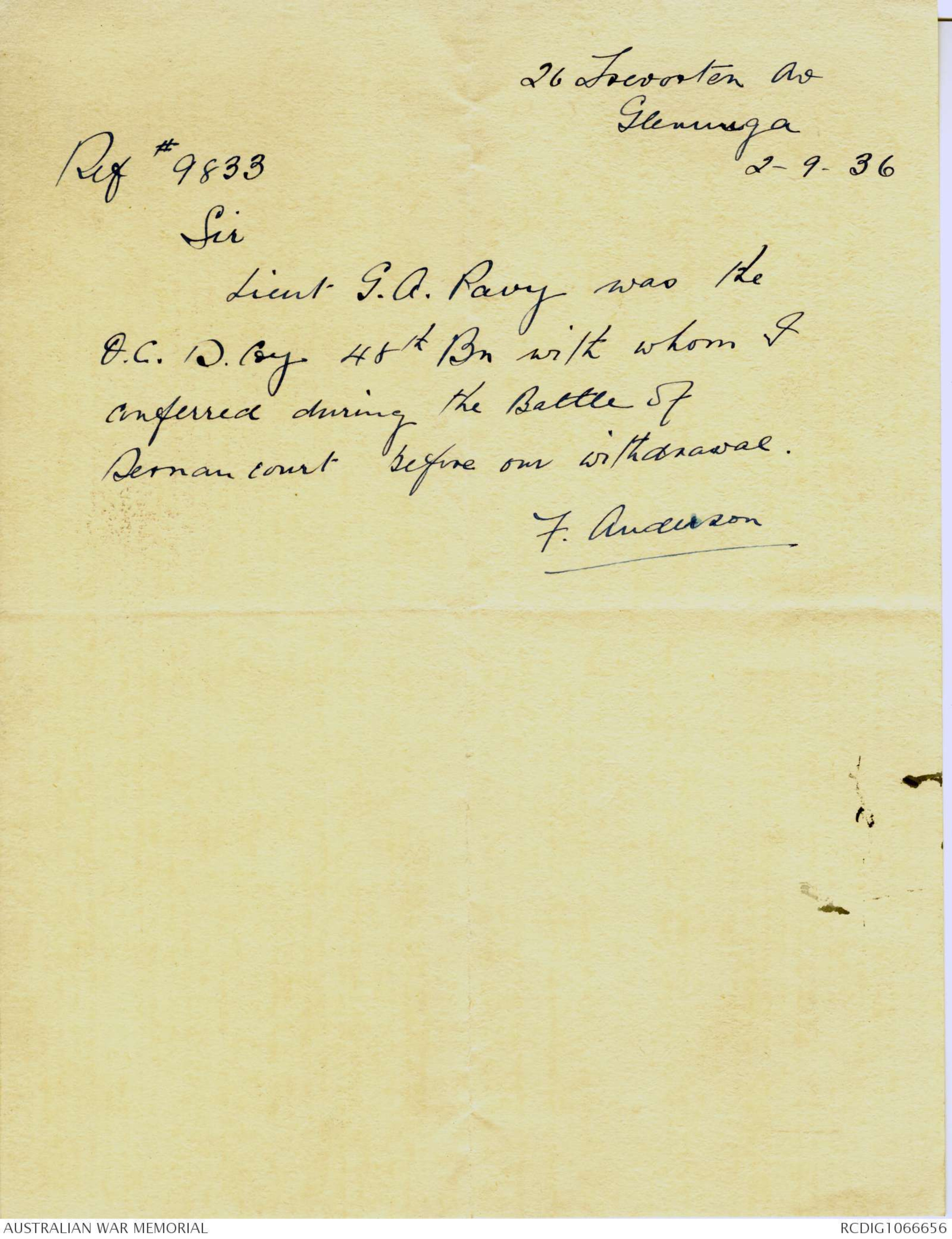
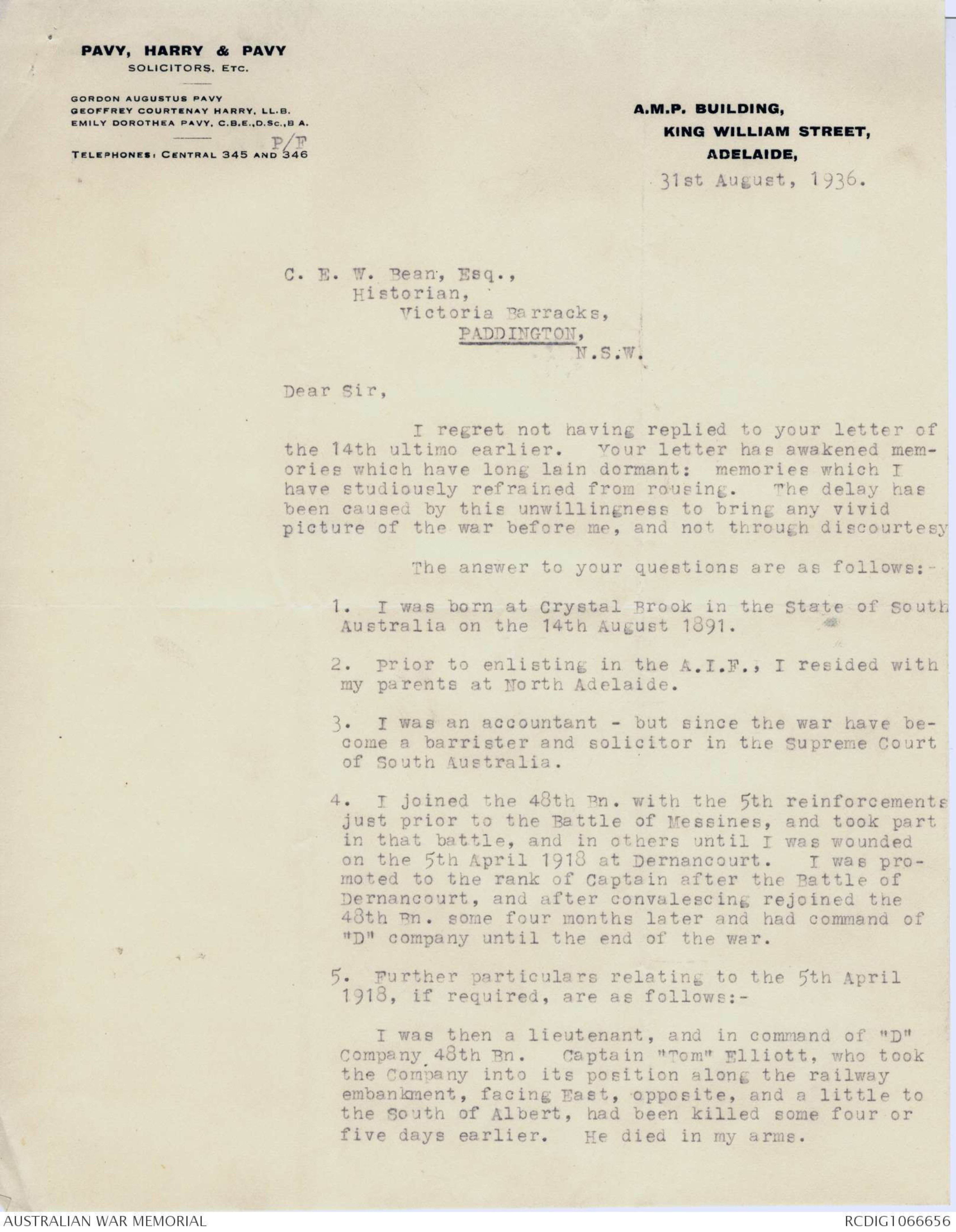
45 Bn C Coy Dernancrt
Chap XI
From Capt. Adams
Vol V
p 133A
Capt Squires lent Bannister his shoulder,xxxxxxx & constantly did so till they were withdrawn. xxxxxxxx
p 158. A.K. McDonald
& Mitchell. were these k in cpat Sheep Pews?
When Adams got out to Perry's coy
he found that they cd see Germans in
front, but cdn't quite make out
what was happening; & ^P wondered
if he ought to go forwd.
McDonald ws k in the c/a; &
Mitchell ws k. also almost as
soon as they left Pioneer Trench.
Both were in the leading Coys.
VIII/40.
available. All the turmoil and bitterness of the referendum
campaign would therefore, even if the referendum had been
favourable, simply have brought the Government back to the
position in which they were in September, when it sought
to avoid forcing a double dissolution. They would have been
strengthened.in the pursuance of their policy by the knowledge
that they had the country at their back, and could have forced
the double dissolution with confidence; but there is a
material difference between that confidence and a legal right
to enforce the ministerial policy by virtue of the referendum.
45 at Dernct. Ap 5 1918.
From Capt N.G.Adams.
HN.
Hand drawn diagram – see original document
PerryDibbs (k Mar 31)
Adams took over C _______________in support to 47th.
Adams B )
Ferguson took over )
Davies D
Holman A
Dibbs ws killed ^Mar 31, Perry got his Coys & Ferguson rety
from Ecq took over B. during mg of Ap 5.
S.Perry ws in/c ^of C. after Dibbs ws k till
Adams came over from B on Apr. 5.
Perry was then at the Sheep Pens - brush wood hurdles scattered abt.
When Adams got there, there ws only 1 pln
left under S.Perry^on open pasture near the sheep pens, (In open.).
Other 3 had bn sent for'd to support 47th & Perry wanted
to know if last pln should go. Adams got glasses
out & cd see men in front giving themselves up.
Adams told them to stay where they were. Waited
After an interval tps appd again ahead, apptly in English tin hats. Waited
till cd see tt advg tps were G. (As they seemed
to be wearing our hats). xxxxx ^There is no doubt they wore our hats. These appeared
after an interval coming from G. direction.
Adams Then had 14 men & 1 L.G. (Bannister). When he
decided they were Gs advg he ordered pln to
fire w L.G. Bannister fired over Madden's
shoulders standing up. Adams was behind
brushwood. Perry got wounded imdly
by Gs advg ahead & ws sent back. We held
attack up - they were on a wide front.
Suddenly a mg opened up from rd our
flank - & as posn ws v, exposed Adams
sent one man after another back to suppt
trench (Pr trench) L.G. to come in last.
Adams then told Allen at H.Q what had
happened.
Davies & Holman led c/a
Adams remained with 8 men in Pr trench.
& folld behind c/a. It ws held up at
exactly / posn Adams had left - the
sheep hurdles. M.g. fire ws so heavy tt they
cdn't get to the road.
47/
45/
49/
There ws no one on Adams left when at Sheep Pens.
28
REVEILLE
October 1, 1935.
Dernancourt - A
Recollection
(By Capt. A.J. Gledhill,
19th Bn.)
For some days previous to April 5, 1918, we had been
leading a more or less peaceful existence in a valley at
the back of Bray, disturbed occasionally by a few shells
which caused those on the wrong side of the depression
one or two anxious moments, much to the amusement of
the men on the safe side. Our situation appeared precarious,
as rumor had it that the German offensive had
penetrated so far south and west that we stood a good
chance of being cut off.
When the usual intense barrage that generally presaged
a hop-over came down on the morning of April 5, orders
were issued to move up in close support. No one seemed
to know exactly what was happening, although the cook's
offsider, whose information was generally reliable, said
there had been a breakthrough. As we moved up during
the morning, the absence of troops and guns was
most marked and there seemed to be little to stop the
enemy from going as far as he wanted.
Arriving at the foot of the high ground overlooking
the railway to Dernancourt, a hurried consultation of the
company commanders-Captains J.H. Willenbrock and
Jim Atkinson, Lieut. Jim Graham, and myself- at battalion
headquarters confirmed the news that Fritz had
broken through at the railway. Jimmy Atkinson was
in high spirits, skylrking with Wally (Willenbrock) as
was his wont. Both these good fellows were killed that
afternoon. We were informed that our battalion (49th),
together with one from the 12th Brigade, was to reestablish
the line, our objective being the railway.
This attack was to be undertaken without artillery
support and, in our case, without bombs. The meeting
was quite a cheerful gathering, ending up with a quiet
"Wahoo."
Despite the lack of preparation due to the urgency of
the affair, the attack moved off in good style at the
sound of the whistle. It was a fine sight to see the
whole battalion extended in open order, two long waves
with scouts out in front. These fellows soon came in
touch with the German skirmishers, with whom they exchanged
a few shots, and then dropped back.
Owing to the formation of the ground the centre company
came under fire sooner than our company ("B")
which was on the left.
As soon as the front rank topped the rise, it was met
by a machine gun barrage like a blast out of a furnace.
Men were dropping fast. More fortunately situated, we
were able to get within a couple of hundred yards of the
German outpost-line before coming into this fire. The
enemy put up a fair opposition, but our men, wild with
excitement, shooting and yelling, were soon on top of
them. The first platoon to get to holts with the Fritzes
was Bill Argue's, on the left, a lad named Bugden,
leading. The Germans, who could do so, broke back
at a run, their officers making valiant efforts to steady
them. One young German dropped his rifle and threw
up his hands a bit late, being shot by the leading man,
who, himself, stopped one almost immediately. Things
were getting a bit mixed, some rough work going on on
the extreme left. A lad with a "Blighty," coming cheerfully
back, was hit again, another's laugh was cut short,
bullets were flying freely. By now we must have been
well in sight of their machine-gunners as the fire seemed
to be just sweeping the top of the ground. During the
attack young Taylor, who had the platoon on the company's
right, passed me cheerfully on his way to the
rear, wounded; unfortunately he never reached there.
From where I was, between the two lines, it was difficult
to see exactly what was going on. I thought the
boys might be going too far, so I made
a sprint forward. The whole German army seemed to
be shooting at me. Anyway I got along and flopped
in a small shell0hole, alongside a sergeant who had been
hit in the body. His cartridges, apparently, exploded
when he was hit. Nothing could be done for him.
From this position the enemy could be seen making a
break for the rear-those who waited being summarily
dealt with. The railway line was still a long
way off, but there was nothing else for it other than to
assume the prone position, tilting the tin hat at the best
considered angle to deflect a shot. Directly in front was a
small mound, thrown up by the opposition. Later, when I
was lying on my back talking to Bob Carlisle, several
Germans hopped up from here. Luckily, they had had
all the fight they wanted.
As soon as it was dusk we occupied the half-dug posts,
taking several prisoners. The escort that marched them
to the rear failed to report back to the company for about
a week, having probably taken them to the coast.
The counter-attack achieved its object in denying the
enemy the use of the high ground that would have given
him command of the main Albert-Amiens road, but at
what a cost. The centre companies ("A" and "D") had
been practically wiped out. During the night Sergeant
Sharp and I made an extended tour along the front, and
for what seemed like hundreds of yards to the right there
appeared to be only a handful of "D" company. It
was most uncanny moving about in the darkness, unaware
whether we were walking into the enemy line
or not. Several times we stalked our own men. We
came across Sergeant Lane and fifteen or so men, and I
had a few words with Lieutenant Turner who had been
badly knocked. The dead and wounded were scattered
thickly over the ground. The limit of their advance was
only too plain the following morning, a line of dead
stretching round the hillside.
That night I had a visit from Major R.F. FitzGerald
(52nd Bn.)-though he was not of our battalion.
(Continued on Next Page)
(Continued from previous [[page?]]
I was pleased to see a senior officer and explain our position,
particularly as our right flank was well in the air.
Later there arrived another visitor in the person of a
Tommy who had escaped through the German line. C.
S,M, Richardson made his journey a bit more hazardous
by shooting at him as he came in. Good shooting, too,
according to the Tommy.
In my company ("B") the casualties were high. The
roll-call, a day or two after, was a sad affair. "C" also
got its issue.
The conduct of all hands during the operation was
beyond praise, particularly that of the runners, whose
dangerous and arduous tasks were so cheerfully undertaken.
No. 3 Copy
CHAPTER VII.
THE ESTABLISHMENT OF MILITARY ADMINISTRATION.
9833.
15 July 1936.
Captain F. Anderson, M.C.,
25, Invergowrie Avenue,
Highgate. S.Aust.
Dear Captain Anderson,
In connection with the Battle of Dernancourt,
April 5th, 1918, the diary of the 48th Battalion states
that about midday, when the 47th began to retire, you
conferred with the commander of the "centre company" (i.e.,
"D" Company) of the 48th, and both of you decided to wait
for a short time in case the 47th counter-attacked. At
12.15, however, as the Germans were firing from your rear,
you gave the word for "A" and "D" companies to retire.
I take it that the officer with whom you conferred
was Lieutenant G.A. Percy, but should be grateful if you
would kindly confirm this from your recollection.
Yours faithfully,
C.E.W. Bean
Official Historian
PARKS AND PLAYGROUNDS MOVEMENT OF NEW SOUTH WALES
DELEGATES TO ANNUAL MEETING, 22ND NOVEMBER 1933
MEN'S RECREATION
(Representatives on Executive Committee, 1932-33: Mr.
A.W.Green, President; Messrs. F.J. Herlihy and C.S.
Watson, Members.)
Amateur Athletic Assocn. Messrs R.P. Heathwood & J.R Butler.
Amateur Swimming Assocn. Messrs. H.R. Kelly & D. Hellmrich.
Aust. Workers' Sports Fedn. Miss M. Swain & Mr. A.W. Winter.
City and Suburban Cricket Assn. Mr. C.A. Fairland.
Combined Hard Court Tennis Assn. Messrs. G.G.Tremlett & J.A. Turnbull.
N.S.W. Cricket Assocn. Messrs. A.W. Green and E.A Tyler.
Metropolitan Hockey Assn. Messrs H. Davidson & A. Seaman.
Junior Cricket Union Messrs J.D. Durham & C.S Watson.
Lacrosse Association Mr. C.R. Gibbs.
Lawn Tennis Association Messrs. M. Henry Marsh and S.E.Wynn
Metropolitan Junior Rugby Union Messrs. C.A. Fairland & L.B.Callaghan.
Northern Districts Cricket Assn. Mr. A. Harrison.
Protestant Churches Soccer
Football Assn.
N.S.W. Rugby Union Messrs. F.J. Herlihy & N.E. Mitchell.
Swords Club Captain F. Stuart.
Y.M.C.A. Mr. B.E. Monfries.
WOMEN'S RECREATION
Representatives on Executive Committee, 1932-33: Mrs /O.
Peatfield, Vice-President; Mrs. F.J. and Miss M.M. Peden,
Members.)
Amateur Athletic Assocn. Messrs. R.P. Heathwood & J.R. Butler.
Amateur Sports Council Miss M.M. Peden & Mrs. F.J. Davy.
Australian Broadcasting Coy. Women's
Association Misses G. and J. Varley.
Aust. Workers' Sports Fedn. Miss M. Swain & Mr. A.W. Winter.
Ladies Amateur Swimming Assn. Mrs. W. Chambers.
Baseball Association Miss R. Jones & Miss Glover.
Basketball Association Mrs. O. Peatfield.
City Girls Amateur Sports Assn. Mrs. D. Delaney & Miss E. Mallard.
Combined Hard Court Tennis Assn. Messrs. G.G.Tremlett & J.A. Turnbull.
Cricket Association Miss M.M. Peden & Mrs. O. Peatfield.
Hockey Association Miss F.J. Davy and Miss Friend.
Lawn Tennis Association Messrs. M.Henry Marsh and S.E.Wynn.
Rowing Association Miss Ellis & Miss Harvey.
Swords Club Captain F. Stuart.
Vigoro Association Mrs. E. Dodge & Mrs. Wilson
Y.W.C.A. Mrs. O. Peatfield.
CHILDREN'S RECREATION
Representatives on Executive Committee, 1932-33: Miss M.M.
Simpson, Vice-President; Miss H.A. Dumolo and Mr.E.Clarke,
Members.)
Feminist Club Mrs. S.E. Vickery & Mrs. A. Hews.
Housewives' Progressive Assn. Miss Portia Geach & Miss Thorp.
Kindergarten Union Miss H.A. Dumolo & Miss K.P. Chase.
Nationa Council of Women Miss Fidler and Mrs. Norton.
Parents & Citizens Fed. Assn.
Public Schools Amateur
Athletic Association Messrs. E. Clarke & S. Lynch.
United Associations Mrs. E I. Proud & Miss M.M. Simpson.
26 Trevorten Av
Glenunga
2-9-36
Ref #9833
Sir
Lieut G.A Pavy was the
O.C. D. Coy 48th Bn with whom I
conferred during the Battle of
Dernancourt before our withdrawal.
F.Anderson
PAVY, HARRY & PAVY
SOLICITORS, ETC.
GORDON AUGUSTUS PAVY
GEOFFREY COURTENAY HARRY, LL.B.
EMILY DOROTHEA PAVY, C.B.E.,D.SC.,B.A.
P/F
A.M.P.BUILDING,
KING WILLIAM STREET,
ADELAIDE,
CENTRAL 345 AND 346
31st August, 1936.
C. E. W. Bean, Esq.,
Historian,
Victoria Barracks,
PADDINGTON,
N.S.W.
Dear Sir,
I regret not having replied to your letter of
the 14th ultimo earlier. Your letter has awakened memories
which have long lain dormant: memories which I
have studiously refrained from rousing. The delay has
been caused by this unwillingness to bring any vivid
picture of the war before me, and not through discourtesy
The answer to your questions are as follows"
1. I was born at Crystal Palace in the State of South
Australia on the 14th August 1891.
2. Prior to enlisting in the A.I.F., I resided with
my parents at North Adelaide.
3. I was an accountant - but since the war have become
a barrister and solicitor in the Supreme Court
of South Australia.
4. I joined the 48th Bn. with the 5th. reinforcements
just prior to the Battle of Messines, and took part
in that battle, and in others until I was wounded
on the 5th April 1918 at Dernancourt. I was promoted
to the rank of Captain after the Battle of
Dernancourt, and after convalescing rejoined the
48th Bn. some four months later and had command of
"D" company until the end of the war.
5. Further particulars relating to the 5th April
1918, if required, are as follows:-
I was then a lieutenant, and in command of "D"
company 48th Bn. Captain "Tom" Elliott, who took
the Company into its position along the railway
embankment, facing East, opposite, and a little to
the South of Albert, had been killed some four or
five days earlier. He died in my arms.
 Sam scott
Sam scottThis transcription item is now locked to you for editing. To release the lock either Save your changes or Cancel.
This lock will be automatically released after 60 minutes of inactivity.